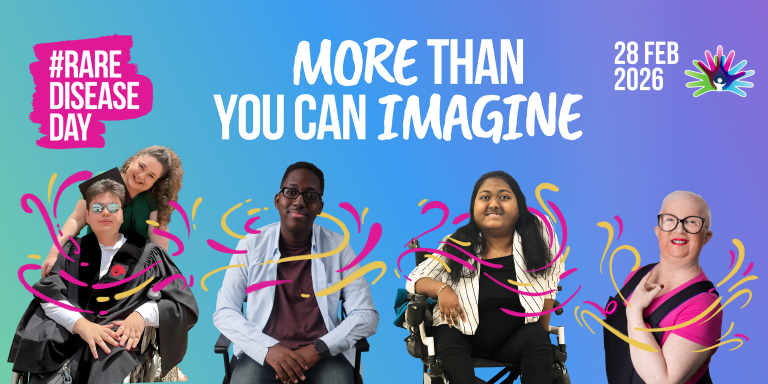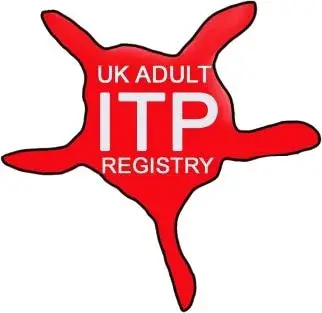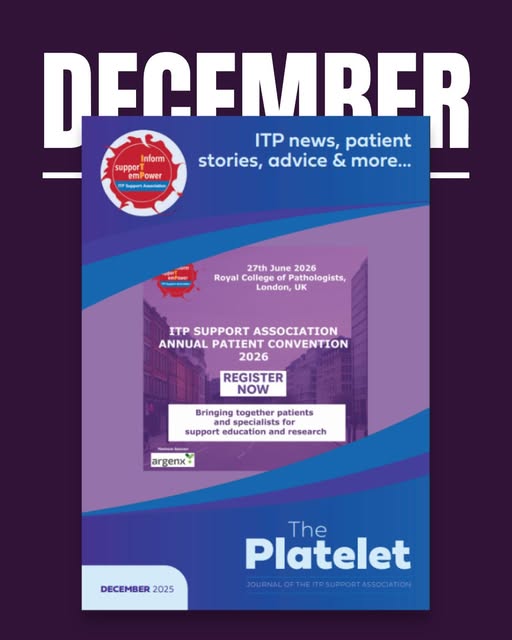ITP Convention 2017 @The RSM
The 20th ITP Convention 2017
Royal Society of Medicine, London.
The 13th is considered by many to be an unlucky number so I am sure, some had misgivings about the date chosen for the annual convention for 2017. They need not have worried.
The venue was exceptional, and the speakers, with the exception of one esteemed gastroenterologist, were all eminent haematologists from the UK, USA and Canada considered to be the whose who in ITP internationally. This year also proved to be the second most attended convention with an increase of over 50% on last year’s attendance.
The total attendance was around 150 which was the full capacity of the Max Raine Lecture Theatre at the Royal Society of Medicine. Not only that, over half of the delegates attending were there for the first time to listen and learn. This I hope, they certainly did.
Our joint CEOs opened this 20th Patient Convention with Mervyn Morgan welcoming everybody to the RSM and Shirley Watson take a brief look at how things have changed since our first Convention in 1998.
Mervyn then made a short presentation of a new APP being developed for patients to record their individuals ITP history.
The first presentation was given by our much-revered professor from Oklahoma, James George. Professor George has visited us on many, many occasions. This time his presentation considered in detail, the treatment of ITP since 1931 to the present day. Consideration was given to the effectiveness of the various treatment from medication and splenectomy, the side effects of all treatments and potential long term effects.
Dr Maria Scully from UCLH (University College Hospital, London) then presented the questions we forget to ask at consultations and the information we forget to give. A wake up call for all patients to be prepared and not frightened to ask questions, and keep on asking until we understand the answer provided. Dr Scully put questions to the audience and responses revealed that quite a few topics she would have expected consultants to discuss with their ITP patients had not been raised at appointments.
The RSM lecture theatre was equipped with an audience response keypad system which was certainly put to the test by Dr. Nichola Cooper from the Hammersmith Hospital. She explored the delegates’ knowledge with pertinent questions regarding platelets and blood. I think, with one or two exceptions, the patients and their family members acquitted themselves with distinction and most proved they are knowledgeable about their own condition.
Following the coffee break, Dr Jecko Thachil from Manchester Royal Infirmary presented the practical aspects of the TPO-RA use. His first questions set the scenario of treatment that he would adopt to treat the patient. The choices of treatment with the new TPO drugs are regulated by NICE. As to which drug, this is very much open for discussion between the patient and the consultant, with due account being taken of the adverse effects of the various drugs. He also considered blood clots and how patients can help themselves to reduce the risk of blood clots. He provided two actual cases where he had learnt from the patients.
Dr Scully then introduced the head to head discussion between Prof. Jim George and Prof. Adrian Newland (Royal London Hospital) on the topic “is splenectomy an outdated treatment for ITP?” Several years ago, this would have been a very lively debate between two of the most diametrically opposed specialists on either side of the Atlantic. As it turned out, it was a very pleasant and informative session and largely a consensus, with both parties agreeing that splenectomy has a place in the treatment of ITP, but not as important as it would have been 20 or 30 years ago.
The afternoon programme started with Prof. Victor Blanchette from the Hospital for Sick Kids, Toronto. His presentation was based on the importance of shared decision making in the management of children with ITP. This was based on the Toronto experience. However, he uses the grading of bleeding severity first produced in 1997 by Dr Paula Bolton Maggs as a starting guide. He also referred to the papers published in Blood by Drew Proven in 2010 and Nancy Nuenert in 2011. Management must be undertaken with the parents of children being fully aware of the procedures to be followed and recommendations of the physician. Depending on the symptoms of the child being treated, it has been recorded that observation as opposed to intervention, has increased from 34% in 2007 to 71% in 2012. These cases have been safely managed. It has also been considered, a short course of prednisolone (without a taper) given due to parental anxiety and quality of life, deserves further study.
This very interesting presentation was followed by a further question and answer session by Dr Nichola Cooper. Again, a very enlightening session which kept all the delegates on their metal to answer the questions posed. Overall, I think the audience come out of the inquisition very well.
Many of our members will have followed the research project we embarked upon about four years ago. This followed a question often asked by patients. “Is ITP due to my diet or gut bacteria?”
Professor John Hunter, a Gastroenterologist Research Fellow from Cambridge, was commissioned to undertake the research. The first phase did not prove conclusive, but did raise, as research often does, additional or supplementary questions. A second phase was commissioned following phase one into colonic microbiome in ITP. Without going into detail, samples of our waste product were required by the laboratory. Sadly few volunteers registered at Addenbrooks for this, but thankfully, Dr Cooper at the Hammersmith, joined the campaign and was able to persuade some volunteers to join in the research.
The second phase has now run its course and as with the first phase, has provided some answers but also raised additional questions. Where we go from here is open for discussion.
The last presentation of the day was given by myself. As many members and readers know, we as volunteers and trustees are invited to participate in the preparation of papers relative to our condition; to contribute in discussions with NICE for the registration of new drugs but particularly to put forward the patients view relative to medical conditions, treatments and drugs.
About two years ago, I was co-opted on a clinical study group who were concerned with bleeding disorders. From this group, a Partnership Setting Partnership was established to ask patients what they would like to see researched. This would be open for any bleeding disorder, of which there are hundreds. The two prime patient groups are the Haemophilia Society and ourselves. The other stakeholders include analysis economists; clinical representatives from London, Cardiff and Oxford; the blood transfusion service, and physiotherapists. The group is under the guidance of the James Lind Alliance, a funding organisation of the NIHR (National Institute of Health Research).
The end result is a web site we would like you to log onto and complete the questionnaire. This will only take about 5 minutes BUT it will provide you with the opportunity to have your say and pose questions for research that you consider important.
Log onto www.stopthebleeding.org.uk
You can also follow on face book and twitter
Facebook – @StopthebleedingUK
Twitter – @StopbleedingUK
The end session of the usual question and answers to the panel chaired by Professor Adrian Newland, was as ever, lively and informative and demonstrated to our panel, that many of our patients are knowledgeable or empowered with knowledge, of their condition. Long may that continue.
The day was closed by Shirley Watson with a hearty thank you to our panel of experts, particularly those from foreign parts. We owe a debt of gratitude to all our experts for giving their time to meet and talk to us.
Report and Pictures by Mr Derek Elston – ITP Association Trustee




